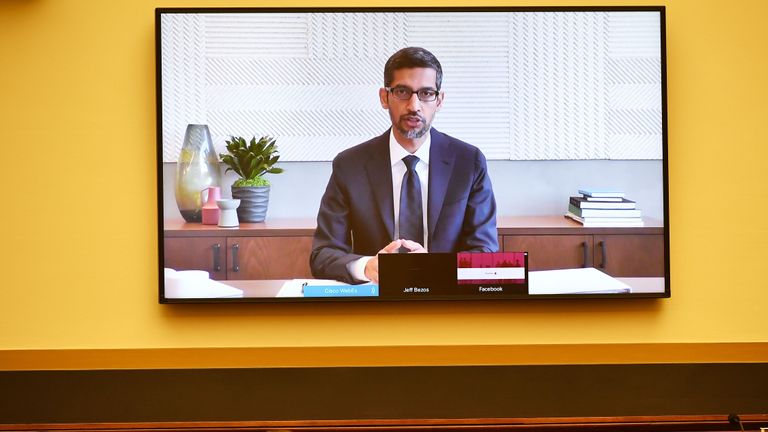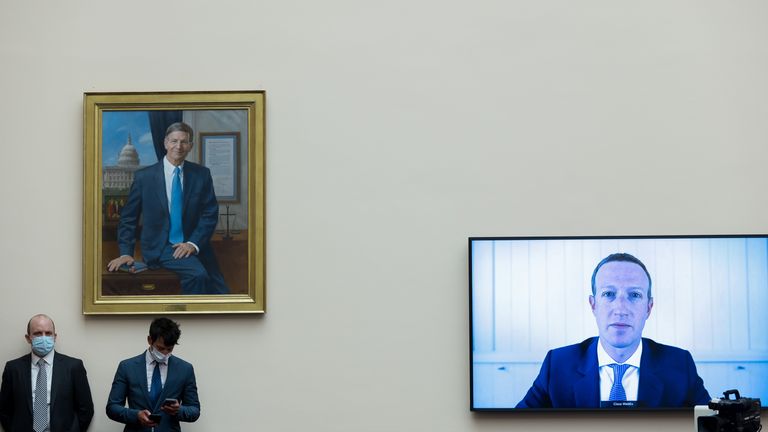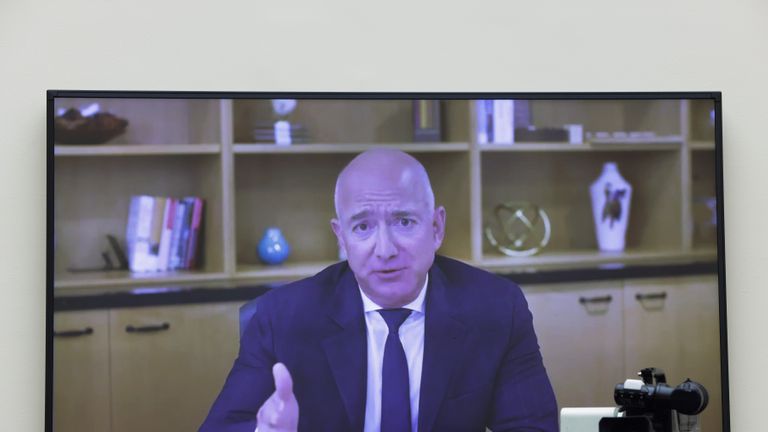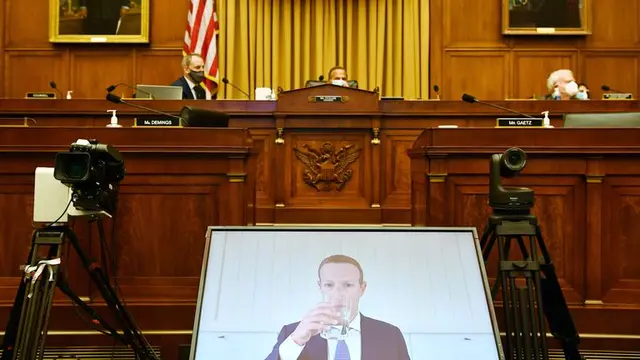Leaders of Amazon, Facebook, Google and Apple have appeared in front of a House committee in the US to defend themselves against claims they have too much power.
The companies, which have a joint market value of more than $5trn (£3.8trn), are facing threats of further regulation in the US, with conservative politicians claiming the
firms are biased against them
.
Democrats are also critical of the tech giants, claiming they use their power and monopoly to silence smaller businesses who may pose a threat.

May: 'If I could legally shut down Twitter, I would'
David Cicilline, a Democrat representative on the House Judiciary Committee's antitrust panel, opened the hearing saying: "Simply put, they have too much power."
He went on to ask Sundar Pichai, the head of Alphabet,
Google's
owner: "Why does Google steal content from honest businesses?"
Mr Cicilline accused the company of attempting to silence Yelp by de-listing it from its search results if it failed to allow it to take reviews from the site.
Mr Pichai disagreed that Google would steal content from other firms, adding that it conducts itself to the "highest standards".
Google also came under attack from Republican Jim Jordan, who claimed the firm could skew its search results to support Joe Biden's presidential campaign, which Mr Pichai denied.

Image:Alphabet's Sundar Pichai was accused of trying to de-list rivals from its site
Facebook's
Mark Zuckerberg was criticised by representatives over his company's purchase of Instagram in 2012 - an acquisition they suggested was prompted by fears that the photo-sharing app could pose a threat to Facebook.
The tech entrepreneur disagreed that was the reason for the purchase, saying: "It was clear that this was a space that we were going to compete in one way or another. I don't view those conversations as a threat in any way."
Mr
Zuckerberg
was also asked about the temporary **removal of Donald Trump Jr from Twitter
** this week, over a video about the efficacy of hydroxychloroquine in treating coronavirus.

Image:Mark Zuckerberg defended his purchase of Instagram in 2012
He appeared to stand in solidarity with the micro-blogging platform, suggesting Facebook would have also removed the content.
Apple
was challenged over its treatment of third-party app developers and accused of changing the rules to benefit the organisation at their expense.
Tim Cook, the head of Apple, said that all developers are treated the same way, and batted away claims that the firm could increase its cut of app sales by saying the developer market is competitive, and designers could move away to other platforms if costs went up.

Image:Apple CEO Tim Cook defended his company's treatment of third-party developers
Meanwhile,
Amazon's
Jeff Bezos was making his first appearance in front of House politicians and was asked about claims his company ran smaller ones into the ground.
Mr Cicilline said that companies which use Amazon as a marketplace have likened getting their payment from the firm as a "drug", in that it feels good initially, but before long they are ran out of business when the shopping giant launches rival products.
**:: Listen to the Daily podcast on **
Apple Podcasts
**, Google Podcasts
, Spotify
, Spreaker
**
"Mr Bezos, this is one of your partners. Why on earth would they compare your company to a drug dealer?" the representative asked.
Mr Bezos replied: "I completely disagree with that characterisation."

Image:Representatives claimed Jeff Bezos of Amazon used his platform to run smaller firms out of business
The richest man in the world also avoided directly answering a question as to whether his company used seller data to make business decisions, saying that the answer was not simple.
The quartet also made comments about the increasing dominance of Chinese technology, and Huawei in particular.
The committee the men appeared at is close to making recommendations in a report that will outline what can be done to tame the power of big tech in the US, after trawling through around 1.3 million documents to come to a conclusion.
 简体中文
简体中文

